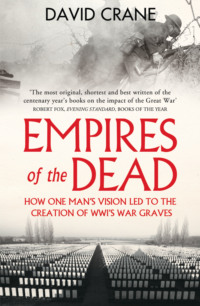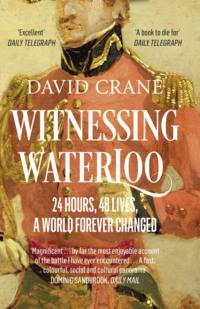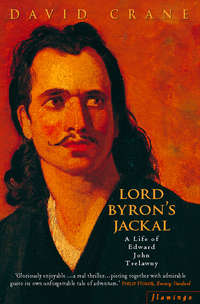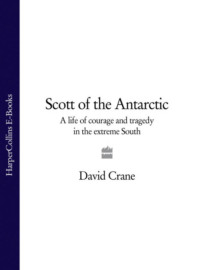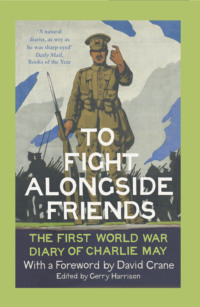
Полная версия
Men of War: The Changing Face of Heroism in the 19th Century Navy

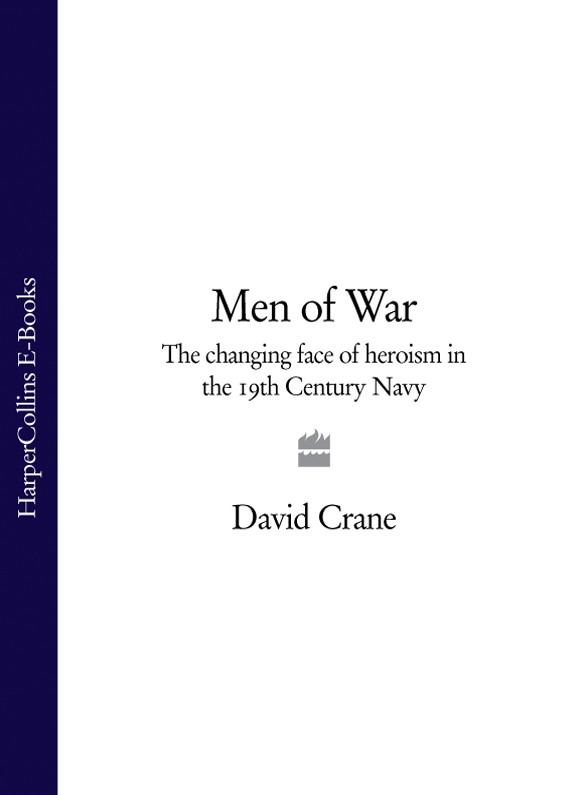
MEN OF WAR
Courage Under Fire in the Nineteenth-Century Navy
DAVID CRANE

Dedication
For my Mother and Father
Contents
Cover
Title Page
Dedication
Introduction: Hastings’s Sword
Hastings: The Happy Warrior
Peel: A Verray Parfit Gentil Knyght
Goodenough: The Sword of the Lord
Epilogue
Acknowledgements
Notes
Select Bibliography
Index
By the Same Author
Copyright
About the Publisher
Introduction
Hastings’s Sword
My sword, I give to him that shall succeed me in my pilgrimage, and my courage and skill, to him that can get it.
John Bunyan, The Pilgrim’s Progress
The boast of heraldry, the pomp of pow’r,
And all that beauty, all that wealth e’er gave,
Awaits alike th’inevitable hour,
The paths of glory lead but to the grave.
Thomas Gray,
‘Elegy Written in a Country Churchyard’
I FIRST CAME ACROSS the idea for this book fifteen years ago in the British School in Athens while working on a biography of Edward Trelawny. I was going through the archive of the great philhellene and historian of Greece, George Finlay, and in among his papers was the draft will of an ex-English naval officer and hero of the Greek War of Independence called Frank Abney Hastings.
It seemed that almost nothing was known of Hastings before he arrived in Greece – aristocratic connections, Trafalgar at the age of eleven, a row with his superiors that brought his career with the Royal Navy to a premature end – but it was the will rather than the man that grabbed my attention. Like almost every document that Hastings ever left it is heavily scored and corrected, but in among a few minor bequests to a servant and friends was a single clause – the gift of an inscribed sword with instructions that it was to be passed down the generations from officer to officer in perpetuity – that seemed to conjure not just a man but a whole world and tradition into vivid and immediate life.
Memory has a way of improving, or at least ‘tidying’ things, and when I went back to the archive some years later the clause was both less elegant and more robust than I had recalled. In it Hastings nominates a man called Edward Scott, 1st Lieutenant of the Cambrian, ‘the finest officer’ he had ever served with, as his beneficiary, with the rider that
he will cause to be inscribed on the blades of my swords and on the Barrels of my Fire arms the following words. Viz ‘This /Gun/ Pistol or sword (as the case may be) was bequeathed by Frank Abney Hastings to his former Messmate Captain Edward Scott RN and I further request of the said Edward Scott that these arms and my Nautical Instruments and my watch, may never be sold but that he should bequeath them to that Naval Officer whose Skill and Valour he most admires.
There is something gloriously immodest and extravagant about this that is typical of Hastings – as if Achilles had bequeathed his shield and sword, and then, what the hell, thrown in his helmet and greaves for good measure – but for all that the idea is still a profoundly generous one. There was nothing unusual in one officer presenting a commemorative sword to another in this way, but what Hastings’s bequest enshrines is not so much a memorial to himself as an idea of naval service that links generation to generation in an organic tradition of ‘Skill’ and ‘Valour’ in which he himself formed one small but brilliant link.
And in spite of the fact that Hastings is now virtually unknown in the country of his birth – and scarcely remembered in the country of his adoption – no nineteenth-century naval officer so boldly carried the torch. It used to be said by a rueful Spanish ambassador that every English captain an enemy faced was a Nelson, and if that is about as accurate as most generalisations about the Royal Navy, it is probably truer of Hastings than it was of any young officer of his generation who learned his trade during the last decade of the Napoleonic Wars.
‘Who is the happy Warrior? Who is he, That every man in arms should wish to be?’ asked Wordsworth, and almost a century before Herbert Read found his own savage answer in the trenches of Flanders, Hastings triumphantly filled the bill. It is possible that he had other interests than fighting and the art of war, but born as he was in the first year of the conflict with Revolutionary France he never knew or seemed to want anything else, fighting against Napoleon and the United States for as long as there were battles to be fought, before transferring his allegiances and genius to the nascent Greece in her struggle for independence from Ottoman oppression.
Hastings has only himself to blame that he is not better known, but as the architect and captain of the first successful steam warship and the great prophet of gunnery and total war, he was the unacknowledged godfather to everything that was bloodiest in the century ahead. ‘Great Britain is especially called upon to acknowledge her obligations to Captain Hastings,’ George Finlay wrote with premature optimism in 1845, at a time when the Royal Navy was tardily implementing the revolutionary lessons Hastings had given the world’s navies almost twenty years before.
By rendering naval warfare not only more destructive, but at the same time making it more dependent on a combination of good gunnery and mechanical knowledge with profound naval skill, he has increased the naval power of Great Britain, where all those qualities are cultivated in the highest degree. At the same time, the civilized world is indebted to him for rendering battles so terrible as to henceforth be less frequent, and for putting an end to naval warfare as a means of amusing kings, and gratifying the ambition of princely admirals, or vainglorious states.
It would have been fun to hear Hastings’s response to these pieties – he could have started a sea battle in a dry-dock – but for all the brutal realism with which he approached the business of war, his friendship with Edward Scott suggests that he was not immune to the navy’s more dashing and chivalrous traditions. ‘SCOTT. (CAPTAIN, 1838)’ Scott’s entry in O’Byrne’s 1848 Dictionary of Naval Officers begins, and nothing could speak more eloquently of the depths of the tradition he represented than that a career of such variety and distinction should now be so utterly and irrecoverably lost:
EDWARD HINTON SCOTT was born about 1789. This officer entered the navy in May, 1798, as Fst. Cl. Vol. on board the ANSON … With five of the [enemy] frigates … she came, 12 Oct., singly into collision, and sustained a loss, with injury to her masts and yards, of 2 men killed and 13 wounded. On 18 of the same month we find her, in company with the KANGAROO 18, enduring a similar loss in a gallant action of an hour and a quarter which terminated in the capture of La Loire of 46 guns and 664 men … While attached to the ANSON Mr Scott contributed, also, to the capture of several fine privateers … In the course of the same year he commanded a rocket-vessel in Sir Sidney Smith’s attack on the Boulogne flotilla. On leaving the BLAZER he became Acting lieutenant of the SKYLARK 16; and while in that brig … he had charge of her boats in a running fight with a French cutter privateer of 8 guns and 48 men, whom, after having cut away her sweeps and chased her for three hours, he drove under the guns of the SKYLARK. On one occasion he landed at Flushing, spiked the 8 guns of a battery, and brought the guard off prisoners … He was frequently, in the SATURN, and her boats engaged with the enemy’s forts and armed vessels (several of which he captured). During his servitude in the ORLANDO he took part in many boat-affairs in the Adriatic and Chesapeake. He commanded her boats too in several skirmishes with the Malay proas in the Straits of Sunda and Malacca, and once succeeded in repelling an attack made by them at night on a wrecked Indiaman, of which he had been placed in charge. In the boats of the CAMBRIAN we find him cutting out, in the Gulf of Athens, with much spirit and judgement, a piratical schooner, carrying two long guns and 50 men, together with three of her prizes … He also assisted at the reduction of Napoli di Romania and, at the head of a hundred seamen, landed there at the request of the Provisional Government, had the good fortune, when the troops entered the town, to save the lives of 2000 Turks, men, women, and children … For these services … was presented with a sword by the Greek Provisional Government … For his conduct in jumping overboard from the ORLANDO and saving the lives of four persons, Capt Scott (who is senior of 1838) received the thanks of the Royal Humane Society.
In an ideal world it would be possible to trace Scott’s inheritance down the generations – in any decent fiction ‘Evans of the Broke’ would be wielding Hastings’s sword in the hand-to-hand fighting with a rammed German destroyer in the Channel in 1917. (In any fiction, on the other hand, it would now be rusting in shame on the bed of the Persian Gulf.) But history is seldom so obliging. It seems doubtful that the sword even got as far as Edward Scott, but the idea of the bequest is too good to let go of; so what follows here, in the lives of Hastings and of two other figures who dazzled their generations – the brilliant William Peel, third son of the Prime Minister, and James Goodenough, the outstanding officer of his time – is a kind of ideal progress of the sword through the late Georgian and Victorian navy that answers to the spirit of Hastings’s will with a faithfulness that no literal or historical descent could possibly hope to do.
There are various reasons for choosing these men in preference to more obvious candidates – Goodenough instead of his more famous contemporary Tryon, for instance – but the first and foremost is that they were, in that special sense of the word reserved to the armed forces, ‘lucky’. In the century between the end of the Napoleonic Wars and the outbreak of the First World War the Royal Navy fought only one fleet-to-fleet action, but in an age in which many a gifted officer was doomed to fret on half-pay, Peel and Goodenough were fortunate enough to see action against the Russians and the Chinese, in ships of the line and in gunboats, at sea and in trenches, off the walls of Acre and on the walls of Canton, in the Baltic and the Crimea, in open boats against pirate junks and on open ground in front of Lucknow against sepoy mutineers.
These were the careers that every nineteenth-century naval or army officer wanted and needed, the opportunities for glory, distinction and advancement that were the life blood of both services. ‘I stay in hopes that war may again break out in some part of our Indian territory,’ one typical young ex-Harrovian, contemplating the horrors of peace, wrote from India to William Peel’s future housemaster in 1829, ‘or that the Russians, succeeding better than they deserve, will at last reach India, when a man who distinguishes himself may have a chance of being rewarded by an extra step in rank, or medal, or something of that kind, instead of, as it is now with us, receiving bare thanks from our worshipful masters the shop-keepers of Leadenhall Street.’
Whether or not it was entirely a matter of ‘luck’ that Peel and Hastings were in the right place at the right time when Russia and British India finally obliged is a nice question – there is at least half a case for arguing that the natural ‘warrior’ gets the wars he ‘deserves’ – but either way, they were born ‘fighters’ in the sense that Hastings understood the word. If this had simply been a matter of courage one could open any nineteenth-century navy list and stick in a pin to find his successors, but Peel and Goodenough were not just men who could and did fight – in Wilfred Owen’s startling boast – like ‘angels’, but officers who in a period of institutional stagnation brought to the business of war all the intelligence, thought, empirical skills, leadership, ambition, aggression, imagination and ‘thirst for glory’ that had once characterised the Nelsonian service that shaped Hastings’s ideals.
And if the absolute dominance of the Royal Navy during the nineteenth century – the French could never be relied on for a fight, and the Russians would rather sink their ships in the Black Sea than face battle – meant that they had to do their fighting in some odd places, they remained always loyal to that tradition. In many ways Peel’s and Goodenough’s careers might have been those of any Victorian army officer, but even when they fought as part of naval brigades hundreds of miles from their natural habitat, in the heat and dust of India or up the rivers of the Mosquito Coast, they remained as unmistakably the products of Hastings’s navy as did the bluejackets under their command.
But while these three careers, spanning a period of seventy years that opens with Trafalgar and closes on the beach of a remote Pacific island, are a celebration of continuity and tradition, they equally reflect an age of rapid and radical change. When Hastings first saw action from the deck of a man-of war he would have approached the enemy at a slow walking pace; but by the time Goodenough took his place on the Admiralty Committee on Designs for Ships of War in the early 187os, sail had given way to steam, wood to armour, and the ad hoc improvisations and confused hell of Trafalgar to dreams of choreographed fleet actions, centralised command, signalling hegemony and speeds of fourteen knots.
In a sense these technical developments left the subjects of this book relatively untouched: Peel did most of his fighting on land, and Goodenough died a very eighteenth-century death. But the navy has always been a microcosm of national life, and no one was immune to the wider social and intellectual changes shaping nineteenth-century Britain. Both Peel and Goodenough first went to sea in the last leisurely days of sail, but if they were Georgians by upbringing and age they were Victorians by instinct and high moral seriousness, and in crucial matters of temperament and faith as remote from Hastings as they were close to him in their gift for war.
And while there are certain men, as John Masters put it in his wonderful evocation of pre-Second World War soldiering with the Indian Army, Bugles and a Tiger, who only come fully alive in battle, there are fewer who are prepared to admit it even to themselves. Over the middle years of the century both Goodenough and Peel would throw themselves into conflicts every bit as savage as anything Hastings knew, but even so they could no more have publicly signed up to his reductive vision of ‘the art of war … in other words, the method of killing men most expeditiously’ than could the Christian country and governments that sent them into action.
Hastings had come of age in a war of national survival that left little room for moral reflection, and had fought for Greece in a savage war of liberation that left still less room for sentiment, but these were dispensations that the generations who fought for Turkey in the Crimea or in the Opium Wars against China never enjoyed. In every war there will always be men who fight for the sheer joy of stabbing and stabbing again the ‘well-killed Boche’, but for anyone else, anyone brought up within the framework of a Christian nation – and it is impossible to overstate the influence of religion on the national life of nineteenth-century Britain – the sheer thrill of battle and the Homeric lust for Glory and Fame that were the unashamed motives of Hastings’s life had to be dissembled into more morally acceptable notions of ‘Duty’, Service’, ‘Patriotism’ and ‘Sacrifice’.
The fighting instincts were no less rampant – ‘After all,’ Thomas Hughes cheerfully asked in Tom Brown’s Schooldays, ‘what would life be without fighting, I should like to know?’ – but no one who had had their first scrap at the back of Thomas Arnold’s chapel at Rugby was ever left in any doubt of the need for a just moral cause. ‘From the cradle to the grave,’ Hughes went on, neatly subsuming the soul, the school playground and the killing grounds of the Alma and Inkerman into one moral universe, ‘fighting, rightly understood, is the business, the real, highest, honestest business of every son of man. Every one who is worth his salt has his enemies, who must be beaten, be they evil thoughts and habits in himself, or spiritual wickedness in high places, or Russians, or Border-ruffians, or Bill, Tom, or Harry, who will not let him live his life in quiet till he has thrashed them.’
The pages of Tom Brown’s Schooldays are as good a place as any to feel the moral change that had overtaken nineteenth-century Britain, and one of the fascinations of the three lives here is the ways in which natural warriors of successive generations justified to themselves Hastings’s ‘art of killing’. As a boy of seventeen William Peel would experience all the thoughtless excitement of action at the bombardment of Acre; but if that takes little understanding, what was it that enabled a man of his intelligence, piety, innate gentleness and background to fight with such brilliance in the Crimea in defence of an Ottoman Empire that was repugnant to every tenet he held?
Perhaps the first and most prosaic answer is that there was a burgeoning belief in the nineteenth century – and one to which Peel ardently subscribed – that God’s Higher Purpose was to be worked out through British civilisation, British arms and British trade. Seldom can the long, disreputable history of the ‘Just War’ have been deflected to such improbable purposes. ‘There cannot be a doubt that it is a just war we are engaged in,’ wrote Captain Hedley Vicars, a natural warrior and Popery-hating zealot who in 1854 looked forward to Britain’s triumph over the Russians in the Crimea as a portent of the imminent ‘coming of the Son of Man’.
There are some people, I know, who cannot imagine how any Christian could ever join the deadly strife of battle; but I can only say with such I do not agree, so I shall not flinch from doing my duty to my Queen and Country, the Lord being my helper … I consider war to be … as much a visitation from the Almighty as cholera or any other scourge; and as on the appearance of that dreadful malady, we do not sit quietly down and let it take its course, but very rightly (trusting in the blessing of God) use every precaution, and employ every means to drive it from amongst us, so in the case of this war with the Russian despot. He has made an aggression against a country (one of our oldest allies), which has given him no just cause of provocation, and has thus disturbed the peace of Europe and let loose upon us the horrors of war, and shall we Britons let him have his way, and tamely look on? God forbid! Rather will we, the Lord being our ‘shield and buckler’ crush the evil, and restore peace and quietness to the land.
There were other, and contradictory, strands at work too, and alongside this growing belief in Britain’s Divine Mission was a lurking anxiety that the sinews of national life had been fatally softened by long years of peace. The triumphant success of the Great Exhibition in 1851 had demonstrated to the world the pre-eminence of British manufacturing, but what if there was a price to pay for prosperity and luxury in a decline of the ‘Race’ that only war could halt? ‘Art?’ exclaims Stangrave in Charles Kingsley’s Two Years Ago (1857), a novel set against the background of a Devon village ravaged by cholera and the mightier national struggle with the Russians taking place on the shores of the Black Sea:
What if the most necessary human art, next to the art of agriculture, be, after all, the art of war? It has been so in all ages. What if I have been befooled – what if all the Anglo-Saxon world has been befooled by forty years of peace? We have forgotten that the history of the world has been as yet written in blood; that the history of the human race is the story of its heroes and its martyrs – the slayers and the slain. Is it not becoming such once more in Europe now? And what divine exemption can we claim from the law? … What if the wise man’s attitude, and the wise nation’s attitude is that of the Jews rebuilding their ruined walls – the tool in one hand, and the sword in the other; for the wild Arabs are close outside and the time is short, and the storm is only lulled a while in mercy, that wise men may prepare for the next thunderburst … Armed industry, which tills the corn among the cannons’ mouths … knows that so long as cruelty and wrong exist on earth, man’s destiny is to dare and suffer, and if it must be so, to die.
It was no coincidence that the two great, sacrificial periods of British polar exploration – the search for Sir John Franklin in the early 1850s and the first stirrings of interest in Antarctica at the end of the century – coincided with two prolonged periods of peace, and war offered opportunities for purging the nation’s soul that not even the self-induced miseries of ‘man hauling’ and starvation rations could match. For Kingsley the conflict with Russia was nothing short of a wakening ‘to a new life – at least to the dream of a new life!’, it was ‘a discipline from heaven’, an expiation for old ‘sins’, a purifying fire that redeemed men and women alike from fripperies and ease. ‘My health is quite restored enough to enable me to walk up to a cannon’s mouth,’ Major Campbell tells the beautiful Valentia St. Just before sailing for the Crimea and a hero’s death on ‘Cathcarts’s Hill’, only yards from where William Peel would win his Victoria Cross. ‘There are noble elements underneath the crust, which will come out all the purer from the fire; and we shall have heroes and heroines rising up among us as of old, sincere and earnest, ready to face their work, and to do it, and to call all things by their right names.’
Along with this sense of national crisis went a growing obsession with masculinity and courage that seems from this distance a reflex of the same insecurity. ‘To understand courage,’ wrote Field Marshal Lord Wolseley – a companion-in-arms and admirer of Peel’s – in a noxious article entitled ‘Courage’ that might have provided chapter and verse for everything that is most paranoid in the whole A.E.W. Mason canon,
one must have thoroughly studied cowardice in all its phases and they are infinite. It is the most subtle of mental diseases, the existence of which may never be known to any but the man whose heart it gnaws at. When the day arrives on which all hearts shall be open, we shall, I am sure be astonished to find that many of those who have passed muster in our ranks as brave men will plead in extenuation of sins committed the astounding fact that they were cowards by nature.
There are, of course, many degrees of courage, endless varieties in its manifestations, but my own experience leads me to believe that this virtue in men follows the same natural laws as obtain in the cases of horses and dogs. The better bred all three are the greater will be the innate pluck …
In our army – as indeed in nearly all good armies – there is a great gap between the social position of the officer and the private. Their education from early infancy has been as opposite as the poles … For the officer to be suspected of any lack of nerve would be fatal to him. He would be shunned and boycotted as a leper, and he had better end his days at once by his own hand.
This, then, was the culture – a culture of national assertion and self-doubt – that shaped the mid-century experience of war, and twisting insidiously around Kingsley’s visions of redemption and Wolseley’s darker obsessions was that bizarre and very Victorian cult of Chivalry that found one of its most famous and handsome incarnations in Sir William Peel. The history of chivalry had already taken some very odd turns by the time of the Crimean War, but under Kingsley’s and Thomas Hughes’s influence ‘the old chivalrous and Christian belief [in] the protection of the weak, the advancement of all righteous causes’ was refined into a search for self-purification and ‘self-conquest’ that reached its highest pitch on the barren uplands above the city of Sevastopol.



